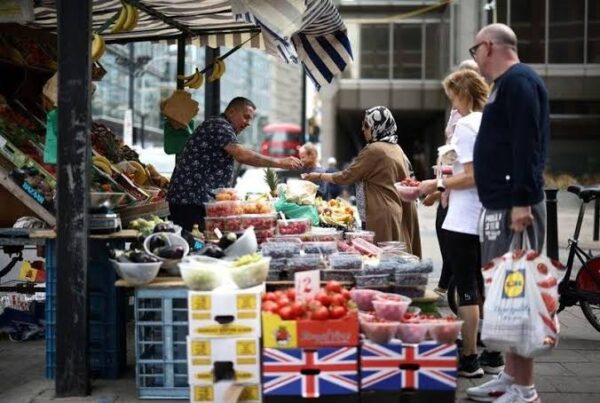UK, Japan slip into recession — what to know and past countries affected

Japan’s economy has unexpectedly slid into a recession, facing consecutive quarters of contraction.
BBC reported that with a worse-than-anticipated 0.4% Gross Domestic Product (GDP) shrinkage in the final quarter of 2023 and a previous 3.3% decline, Japan surrenders its world’s third-largest economy status to Germany. Economists, previously optimistic about a 1% growth, now confront the stark reality of a recession.
The International Monetary Fund (IMF) predicts Germany’s ascension to the third spot, pending final economic data releases. Japan’s economic worth, valued at $4.2tn in 2023, trails behind Germany’s $4.4tn, fueled by yen depreciation against the dollar.
Similarly, the UK economy has slipped into recession at the end of 2023, with GDP contracting by 0.3% in the fourth quarter, following a decline of 0.1% in the previous three months. This marked the first recession since the initial COVID-19 lockdown in 2020.

Daily Trust reported that Prime Minister Rishi Sunak’s economic growth promises faced scrutiny as Chancellor Jeremy Hunt attributed the output fall to inflation and high-interest rates. Despite assurances of a turnaround, Shadow Chancellor Rachel Reeves criticized the government’s handling of the economy.
The fourth-quarter contraction was the largest since the pandemic’s peak in 2021. Economists had anticipated a 0.1% decline but were surprised by the 0.3% fall. Overall, the economy grew by a meager 0.1% for the year, the weakest growth since the 2009 financial crisis.
The recession affected various sectors, with manufacturing, construction, and wholesale experiencing the most significant declines. Retail and wholesale were particularly affected in December, offsetting growth in other areas.
Read more stories on recession:
The IMF’s deputy head cites the weakening yen as a pivotal factor in Japan’s slipping rankings, despite benefits to export-driven companies.
Tokyo’s Nikkei 225 index hits a historic high, reminiscent of the 1990 peak, amidst economic turmoil. With the latest GDP slump, the Bank of Japan faces pressure to defer interest rate hikes, relying on negative rates to stimulate spending and curb currency appreciation.
What it mean for a country to slip into recession?
A recession is a significant decline in economic activity that lasts for an extended period of time, typically characterized by a decrease in GDP, income, employment, manufacturing, and retail sales. It is a widespread and severe economic downturn that affects various sectors of the economy of a country.
There are several causes of a recession, including:
High inflation: When prices rise too quickly, it can lead to a decrease in consumer spending as the purchasing power of individuals diminishes.
Asset bubbles: Speculative bubbles in assets such as real estate or stocks can burst, leading to a sudden drop in their value and causing economic instability.
Decrease in consumer confidence: If consumers become uncertain about the future, they may reduce their spending, which can have a domino effect on businesses and the overall economy.
Global factors: Economic recessions can also be triggered by global events such as wars, natural disasters, or financial crises in other countries that impact international trade and financial markets.
When a country slips into a recession, it means that its economy is experiencing a period of negative economic growth, high unemployment rates, decreased consumer spending, and reduced business investments. This can have widespread implications for the country, including:
Unemployment: As businesses cut costs and reduce production, they may lay off workers, leading to higher unemployment rates.
Reduced income: With fewer job opportunities and lower wages, individuals may experience a decline in their income levels.
Government revenue: A shrinking economy can also lead to lower tax revenues for the government, impacting public services and infrastructure projects.
Impact on businesses: Companies may struggle to survive during a recession, leading to bankruptcies, closures, and reduced investments in new projects.
Overall, slipping into a recession can have long-lasting effects on a country’s economic health and well-being, making it crucial for policymakers to implement measures to stimulate economic growth and recovery.
List of countries that have slip into recession in the past
Several European and African countries have experienced periods of recession in the past. Here are a few examples:
Greece
Greece faced a severe economic recession that started around the end of 2008 and lasted until 2013. The country’s economy contracted significantly during this period due to factors such as high government debt, structural issues, and the global financial crisis.
Spain
Spain went through a recession around the same time as Greece, with the effects lasting until around 2013. The country faced a housing market crash, high levels of private sector debt, and banking sector troubles that contributed to its economic downturn.
Italy
Italy entered a recession in 2011, which was part of the greater Eurozone crisis. The country struggled with high government debt, low productivity growth, and a lack of competitiveness in its economy.
South Africa
South Africa experienced a recession in 2008 and 2009, largely due to the global financial crisis at the time. Factors such as reduced demand for exports, domestic political instability, and electricity supply issues contributed to the economic downturn.
Nigeria
Nigeria fell into recession in 2016, primarily as a result of falling oil prices, which significantly impacted the country’s oil-dependent economy. The recession lasted until 2017 before the country started to see some economic recovery.
These examples highlight some of the European and African countries that have faced recessions in recent years and the various factors that contributed to their economic downturns.




